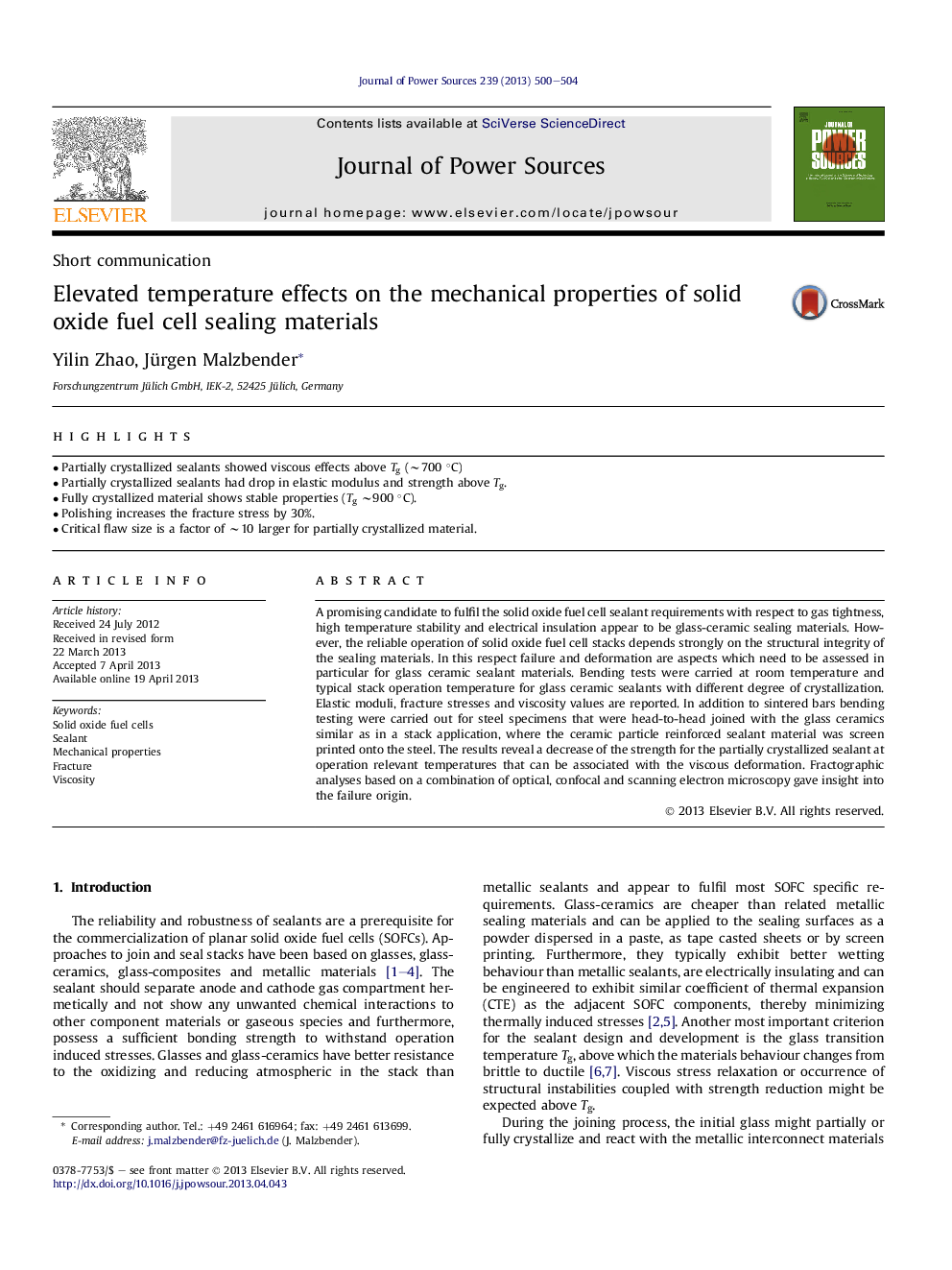| کد مقاله | کد نشریه | سال انتشار | مقاله انگلیسی | نسخه تمام متن |
|---|---|---|---|---|
| 7740193 | 1497993 | 2013 | 5 صفحه PDF | دانلود رایگان |
عنوان انگلیسی مقاله ISI
Elevated temperature effects on the mechanical properties of solid oxide fuel cell sealing materials
ترجمه فارسی عنوان
اثرات حرارت بالا بر خواص مکانیکی مواد جامد اکسید سلول سوختی
دانلود مقاله + سفارش ترجمه
دانلود مقاله ISI انگلیسی
رایگان برای ایرانیان
کلمات کلیدی
ترجمه چکیده
یک کاندیدای امیدوارکننده برای تطبیق شرایط سیلانت سلول سوختی اکسید جامد با توجه به انعطاف پذیری گاز، پایداری دمای بالا و عایق الکتریکی، به نظر می رسد مواد سرامیکی شیشه ای است. با این حال، عملیات قابل اطمینان پشته های سلول سوختی اکسید جامد به شدت به تمامیت ساختاری مواد مهر و موم بستگی دارد. در این رابطه، شکست و تغییر شکل، جنبه هایی هستند که باید به ویژه برای مواد مهر و موم سرامیک شیشه ای مورد ارزیابی قرار گیرد. تست های خمش در دمای اتاق و دمای عملیاتی پخت برای سیلانت های شیشه ای سرامیکی با درجه درجه بندی مختلف انجام شد. ماژولهای انعطاف پذیر، تنش شکستگی و غلظت ویسکوزیته گزارش شده است. علاوه بر تیرهای خرد شده، آزمایشهای خمشی برای نمونه های فولادی که سرامیک سرامیکی با سرامیک شیشه ای شبیه به یک کاربرد پشته بود، جایی که مواد سرامیکی تقویت شده از مواد مهر و موم بر روی فولاد چاپ شد، انجام شد. نتایج نشان می دهد کاهش قدرت برای سیلانت نیمه کریستالیزه شده در دمای مربوطه عمل می کند که می تواند با تغییر شکل چسبنده مرتبط باشد. تجزیه و تحلیل فراکتوگرافی بر اساس ترکیبی از میکروسکوپ الکترونی اپتیک، کانوکنال و اسکن، بینش مناسبی را در بر دارد.
موضوعات مرتبط
مهندسی و علوم پایه
شیمی
الکتروشیمی
چکیده انگلیسی
A promising candidate to fulfil the solid oxide fuel cell sealant requirements with respect to gas tightness, high temperature stability and electrical insulation appear to be glass-ceramic sealing materials. However, the reliable operation of solid oxide fuel cell stacks depends strongly on the structural integrity of the sealing materials. In this respect failure and deformation are aspects which need to be assessed in particular for glass ceramic sealant materials. Bending tests were carried at room temperature and typical stack operation temperature for glass ceramic sealants with different degree of crystallization. Elastic moduli, fracture stresses and viscosity values are reported. In addition to sintered bars bending testing were carried out for steel specimens that were head-to-head joined with the glass ceramics similar as in a stack application, where the ceramic particle reinforced sealant material was screen printed onto the steel. The results reveal a decrease of the strength for the partially crystallized sealant at operation relevant temperatures that can be associated with the viscous deformation. Fractographic analyses based on a combination of optical, confocal and scanning electron microscopy gave insight into the failure origin.
ناشر
Database: Elsevier - ScienceDirect (ساینس دایرکت)
Journal: Journal of Power Sources - Volume 239, 1 October 2013, Pages 500-504
Journal: Journal of Power Sources - Volume 239, 1 October 2013, Pages 500-504
نویسندگان
Yilin Zhao, Jürgen Malzbender,
